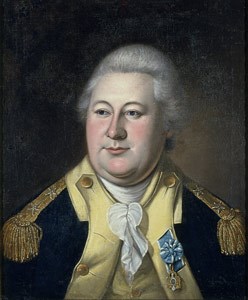
Charles Willson Peale, c. 1784 Independence National Historical Park Congressional Pay
"… the frame of Government could not, with propriety, be much higher toned than the one proposed. It is so infinitely preferable to the present Constitution, and gives such a bias to a proper line of conduct in future, that I think all men, anxious for a National Government, should zealously embrace it." -Henry Knox to George Washington
The Convention took up Article VI Section 9: "The members of each House shall be ineligible to, and incapable of holding any office under the authority of the United States, during the time for which they shall respectively be elected: and the members of the Senate shall be ineligible to, and incapable of holding any such office for one year afterwards." Charles Pinckney (SC) argued that this provision was degrading, since election indicated that incumbents had the trust of the people, and inconvenient, since it would keep the fittest men out of office. He moved to postpone and instead consider ineligible to any U.S. office for which they were paid, with acceptance of a paid office vacating their congressional seat. Mifflin (PA) seconded. Mason (VA) vehemently opposed the new motion, as did Gerry, Williamson (NC), Sherman (CT), and Ellsworth (CT). Mercer (MD) strongly supported Pinckney - Wilson (PA) and G. Morris also (PA) supported the motion. It lost. Morris then moved to except military offices from the prohibition. Broome (DE) seconded and Randolph (VA) supported before Butler (SC) and Charles Pinckney proposed a postponement. Article VI, Section 10: Members of Congress to be paid by the states - was taken up. Ellsworth said he had changed his mind, and moved that this should be paid out of the Federal treasury. G. Morris, Langdon (NH), Madison, Mason, Broom, Sherman, Carroll (MD) and Dickinson (DE) supported Ellsworth; Butler and Luther Martin (MD) defended payment by the State; Gerry saw arguments on both sides. Ellsworth's motion passed. Ellsworth proposed fixing the salary at $5.00 per day, Strong suggested $4.00. After Ellsworth's motion for $5.00 lost, the Convention agreed to let Congress determine its own pay by law. NEXT >>>
|
Last updated: February 26, 2015
